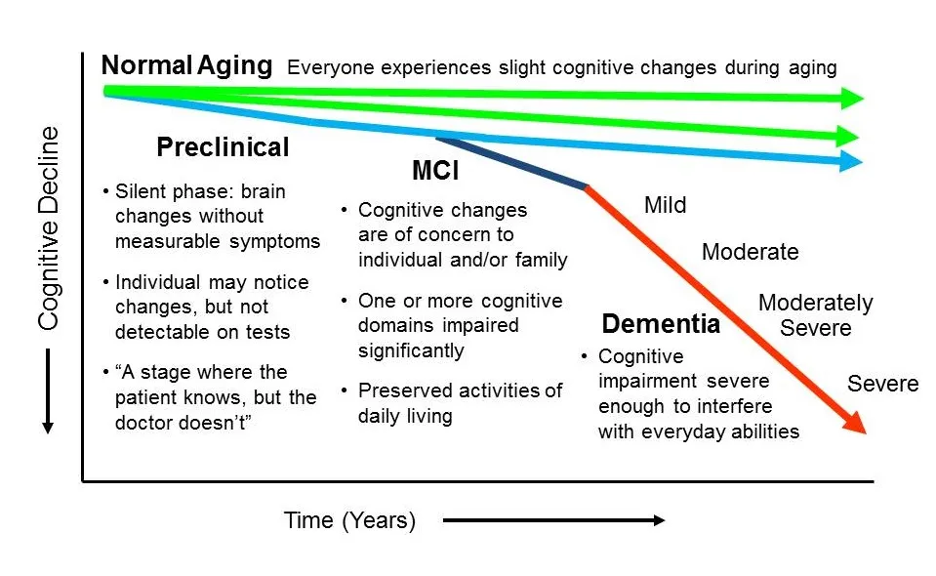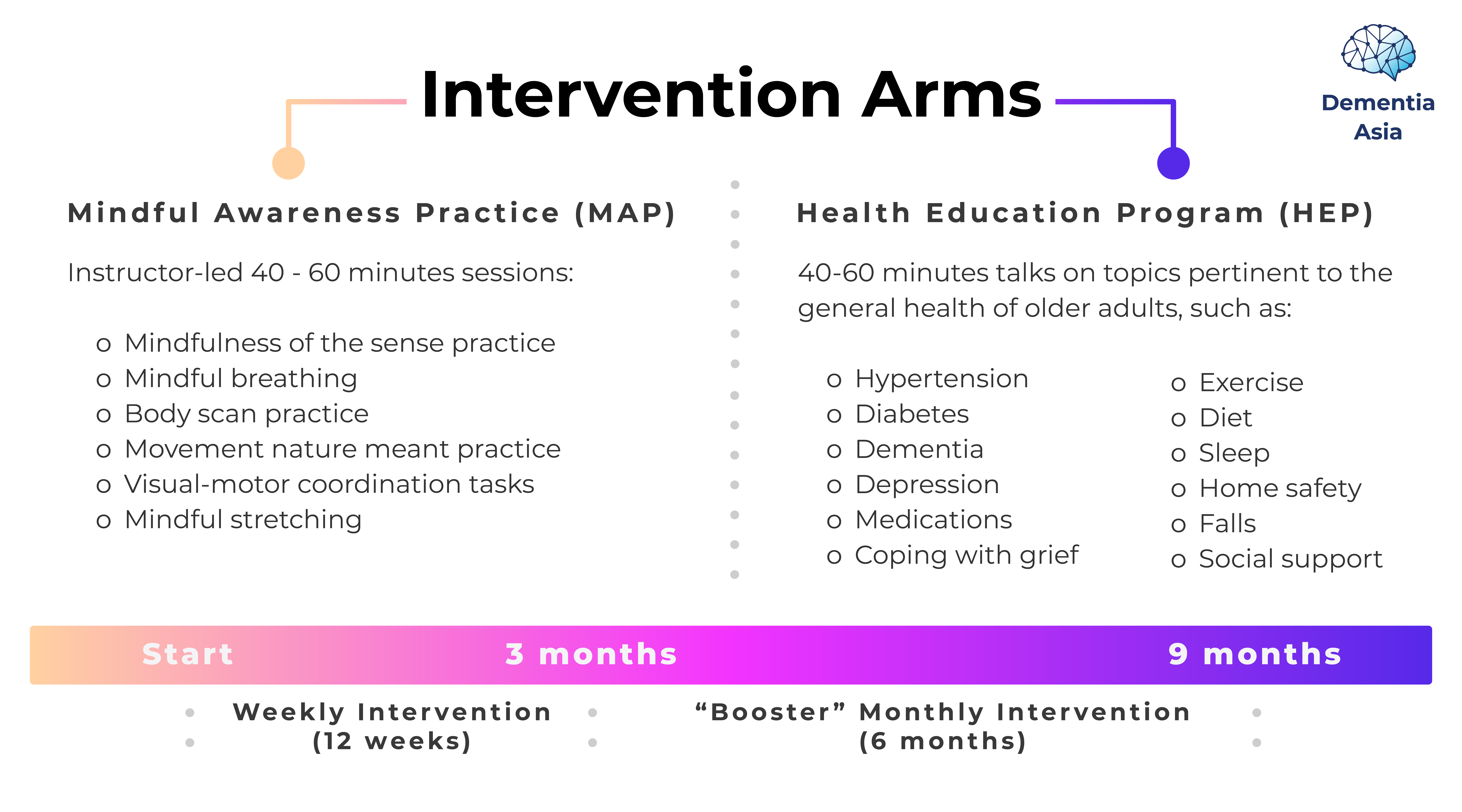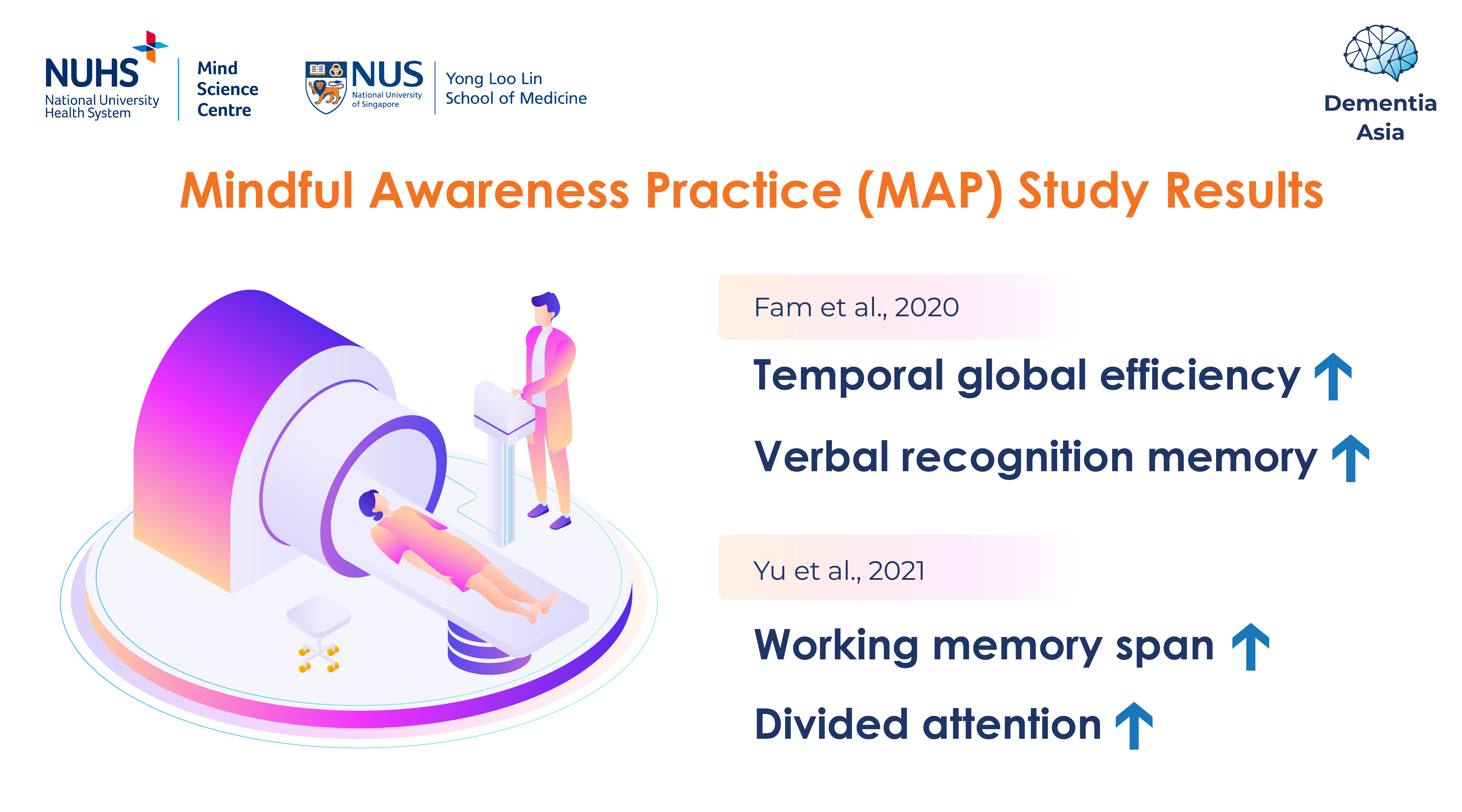Dementia in Asia – Mindfulness to improve cognitive impairment

The trend is clear, the world’s population is ageing. Along with the ageing population, the incidence of mild cognitive impairment (MCI), and by extension dementia, is also expected to increase. However, no new treatment options have been found in the past decade. While various drug trials have been done throughout, most have failed to show effectiveness in slowing or reversing dementia symptoms.
As such, much interest has shifted towards non-pharmacological interventions, with mindfulness practice being at the forefront. Past studies have shown its potential in evoking relaxation responses, changes in gene expression, brain function, and reducing inflammatory responses in healthy adults. However, there is a lack of literature about its effects in different target populations, especially in those with MCI.
To fill in that gap, researchers at the NUS Mind Science Centre (MSC) seek to validate mindfulness practice’s potential in preventative intervention to delay cognitive decline in Asian older adults with MCI. We had carried out random control trials (RCTs) to examine the bio-psychological effect of mindfulness intervention. Our studies found supportive evidence that mindfulness could be a potential intervention method for MCI and dementia as it affects cognitive function, and neuroplasticity, as well as neuroimaging and neuropsychiatric measures.
What is mindfulness meditation?
Mindfulness is a form of meditation that teaches participants to focus on the current moment in an intentional and non-judgmental manner. Previously, it has been evaluated for use in managing stress, depression, anxiety, chronic pain, and insomnia.
Mindfulness mediation leads participants to focus on intentionally maintaining a moment-by-moment awareness of their internal and external experiences, namely their thoughts, feelings, bodily sensations, and the surrounding environment. Participants are also taught to experience all those in a non-judgemental way, simply accepting what is happening at the present moment without evaluating the past or imagining the future.
Why target those with mild cognitive impairment (MCI)?

Picture Source: doctordementia.com
Unfortunately, there is still no treatment for dementia, with management programmes primarily focusing on delaying the progression and onset of symptoms. Mild cognitive impairment (MCI) has been positioned as the intermediate stage between healthy ageing and dementia. Numerous past studies have also found that interventions can alter the course of subsequent cognitive decline, by delaying or even reversing certain symptoms. This is to say that early treatment in dementia is crucial in maximizing treatment outcomes and functional independence.
Mindfulness meditation as an intervention for MCI
Participants in MSC’s random control trials were randomly assigned to join either the treatment arm (MAP) or control arm (HEP).

Treatment arm: Mindful Awareness Practice (MAP)
Participants in the treatment arm of our studies participated in instructor-led Mindful Awareness Practice (MAP) sessions weekly for the first 12 weeks, followed by monthly sessions for another 6 months (Fam et al., 2020; Yu et al., 2021). MAP techniques were modelled after the didactic of McBee’s mindfulness-based elder care (MBEC), a version of the original mindfulness-based stress reduction (MBSR) practice that has been adapted to better suit older adults.
Various mindfulness techniques were employed within the MAP sessions, including:
- Mindfulness of the sense practice
- Mindful breathing
- Body scan practice
- Movement nature meant practice
- Visual-motor coordination tasks
- Mindful stretching
Above instructor-led sessions, participants were also asked to continue practising at home daily. Participants were provided personal diaries to record their practices at home and asked to return them at the subsequent sessions to measure the adherence to daily practice and frequencies of home practice.
Control Arm: Health Education Program (HEP)
As an active control, 50% of participants were randomly assigned to join a health education program, delivered by a panel of healthcare professionals including clinicians, nurses, and psychologists. Topics of prevalence to the general older adult were discussed, weekly for the first 12 weeks, followed by monthly sessions for the next 6 months (Fam et al., 2020; Yu et al., 2021). Topics include:
- Hypertension
- Diabetes
- Dementia
- Depression
- Medications
- Coping with grief
- Exercise
- Diet
- Sleep
- Home safety
- Falls
- Social support
Key results: mindfulness shows potential in improving bio-psychological functions in older adults with MCI

Improved information processing through Mindful Awareness Practice (MAP)
The study by Fam et al. (2020), hypothesized that mindfulness practice would improve dynamic functional connectivity (FC) in subjects with MCI. FC refers to how certain regions of the brain are functionally related. That is to say that two separate, distant regions of the brain may be active at the same time when people do certain functions. Dynamic fluctuations in FC thus reflect a globally coordinated variation in network efficiency over time and represents a continual effort to balance information processing and metabolic expenditure.
Participants were randomly assigned to either MAP (treatment arm) or HEP (control arm) weekly sessions for 12 weeks. For this study, sessions were not extended beyond the first 12 weeks. Functional magnetic resonance imaging (f-MRI) of the brain and neurocognitive tests were performed at baseline and 3-month.
Results from the study found improved regional dynamic FC and temporal global efficiency. Data analysis showed localized changes of temporal nodal properties in the right cingulate gyrus, insula, and left superior temporal gyrus. This suggests that communication flow will have fewer intermediate steps and consequently less signal degradation. This finding extends past literature which found improved static FC in healthy mindfulness practitioners.
Above that, the study also found improved verbal recognition memory in the MAP group, while the opposite effect was found in the control group. This finding supports a previous study with healthy participants which found that mindfulness led to decreased false positive errors in a recognition memory task using neutral words.
It was suggested that the improvements found in the MAP group can be accredited to the nature of mindfulness practice which improves self-awareness. This consequently improves the connectivity of the insula, which plays a key role in sensory and motor responses, information processing, and cognition. Improved connectivity in the insula thus suggest improvements in overall cognitive function (Fam et al., 2020).
Constant mindfulness practice improves working memory span
Yu et al. (2021) theorized that improvements in cognitive functions of MCI patients accompany neuroplastic changes in the brain. Researchers at MSC carried out a randomized controlled trial among community-dwelling older adults with MCI to examine the effects of a mindfulness-based intervention on various cognitive outcomes and cortical thickness (CT) in the context of age-related cognitive impairment.
Participants were randomly allocated to join MAP (treatment arm) or HEP (control arm) sessions, weekly for the first 12 weeks, and monthly for the following six months. Eight cognitive outcomes, indexing working memory span and manipulation, divided attention, immediate, delayed and recognition memory, verbal fluency and visuospatial processing from various tests were administered. MRI scans were also taken at baseline, 3-month and 9-month of intervention.
The study found gradual improvements in working memory span and divided attention across the 9-month intervention period, along with significantly increased CT in the right frontal pole. At 3-month, significantly increased CT in a left ITG cluster was also observed in MAP participants. This increase, however, was not sustained at 9-month, again suggesting that the effects of MAP on cognitive functions are frequency-dependent (Yu et al., 2021).
Conclusion
Mindfulness meditation brings forth cognitive benefits as it involves focused attention and open monitoring. The practice trains the meditator to direct and sustain attention for a period of time. Above that, mindfulness practice also requires participants to attend to the moment-by-moment experience in the ‘here and now’ in a non-judgmental manner. In doing that, participants are trained to divert attention from distracting stimuli.
The research done at Mind Science Centre provides evidence-based data that supports the use of mindfulness practice as an intervention method for MCI and dementia. Above bio-psychological benefits through improvements in brain neuroplasticity and cognitive function, mindfulness meditation also has great potential for successful implementation as it is low-cost, self-directed, and can be practised without time and space constraints.
References
Fam, J., Sun, Y., Qi, P., Lau, R. C., Feng, L., Kua, E. H., & Mahendran, R. (2020). Mindfulness practice alters brain connectivity in community‐living elders with mild cognitive impairment. Psychiatry and Clinical Neurosciences, 74(4), 257–262. https://doi.org/10.1111/pcn.12972
Yu, J., Rawtaer, I., Feng, L., Fam, J., Kumar, A. P., Kee-Mun Cheah, I., Honer, W. G., Su, W., Lee, Y. K., Tan, E. C., Kua, E. H., & Mahendran, R. (2021). Mindfulness intervention for mild cognitive impairment led to attention-related improvements and neuroplastic changes: Results from a 9-month randomized control trial. Journal of Psychiatric Research, 135, 203–211. https://doi.org/10.1016/j.jpsychires.2021.01.032
